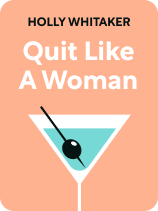

This article is an excerpt from the Shortform book guide to "Quit Like a Woman" by Holly Whitaker. Shortform has the world's best summaries and analyses of books you should be reading.
Like this article? Sign up for a free trial here.
What is the importance of self-care in recovery? Why should you be kind to yourself when working toward sobriety?
In Quit Like a Woman, Holly Whitaker argues that one of the most important facets of your recovery journey is to learn to be kind to yourself to heal your inner wounds. Only when you’re gentle and forgiving with yourself will you be able to stop suffering permanently.
Let’s look at several aspects of practicing self-care in recovery.
1. See Yourself as Inherently Good and Worthy
The first step to exploring self-care in recovery is to view yourself as innately good and worthy of happiness and fulfillment, insists Whitaker. When you see yourself as broken and unworthy, you’ll beat yourself up when you misstep, and this negativity will only turn you more to the substances you’re trying to avoid.
Understand that to recover and build a fulfilling life free from addiction, you don’t need to remove, suppress, or hide parts of yourself, writes Whitaker: You’re good just as you are. Instead, find the right tools, systems, and structures that allow you to thrive.
2. Understand Your Inner Wounds
Additionally, seek to understand what inner wounds you’ve used addictive substances to try to heal, advises Whitaker. Inner wounds can result from extreme events like assaults, exposure to warfare, childhood neglect, and so on. They can also come from the less acute negative events that occur on a daily basis, like being yelled at by your boss or broken up with. When you understand your inner hurt, you can treat yourself more kindly because you know why you engage in negative or self-destructive behaviors—you don’t think it’s simply an inherent weakness you must stamp out.
(Shortform note: Whitaker recommends understanding your inner wounds to heal yourself. But is there a way to prevent inner wounds from happening in the first place? The answer to this question might be to develop resilience. You can do this by confronting things you fear before they have a chance to wound you. For instance, if you fear being broken up with and suspect this would create an inner wound, consider having a conversation with your partner about this preemptively. You can gauge their feelings and explain your own, thereby reducing the chance of a breakup—or of it seriously hurting you if it does happen.)
3. Be Willing and Committed, Nothing More
Whitaker asserts that you can further be kind to yourself by simply committing and being willing to recover. “Committing” implies you’re independently choosing to pursue sobriety and that if you accidentally veer from that path, you can get back on it with no further negative consequences. Similarly, being “willing” implies that you don’t have to know exactly how to recover but that you’re open to discovering. Both framings allow for slips (which are human and inevitable) and inexperience (which is also natural).
(Shortform note: In You Are A Badass, Jen Sincero frames the recommendation to be committed and willing to recover (without knowing precisely how to do so) in more spiritual terms. In her view, being committed and willing is tantamount to putting your wants and needs into the universe so the universe can send them to you. Thus, if you communicate to the universe that you want to recover, it will show you how to do so without your having to know. However, Sincero does follow this up by insisting that you not only put your desires into the universe but that you also take action to bring them about. You might simply take whatever action seems appropriate and let the universe continue to guide you.)
4. Trust That You Know What’s Best for You
Trust your instincts about how to best recover, stresses Whitaker. You know yourself and your needs better than anyone else, so give yourself permission to trust your gut, even when doing so goes against the norm. You should consider the expert advice of therapists and other guides, but always run their advice past your own internal judge before implementing it.
For instance, if your friends tell you to avoid bars at all costs, but you feel instinctively that you can go to bars and not drink, then do that. Conversely, if people tell you you should find a full-time job right away to get your life back on track, but your gut tells you that’s not the right move for you, listen to your gut.
Similarly, Whitaker emphasizes that you can trust that your version of sobriety is correct. Not everyone will define a sober lifestyle in the same way, and some will tell you you’re not truly sober if you take painkillers when necessary or occasionally do recreational drugs, for instance. Don’t listen to these people. Pursue the sobriety that will make you feel empowered and fulfilled.
5. Let Yourself Feel Emotions Without Self-Judgment
Whitaker further recommends that you allow yourself to feel emotions, positive or negative, without suppressing them or judging yourself for having them. This lets you cope healthily with the emotion rather than having it consume you and ultimately drive you back to addictive behavior.
For instance, if you feel envious of your friend who’s just purchased a car while you struggle to get out of your gambling debt, allow yourself to feel that envy without self-judgment. This way, you can work through your envy and let it pass, rather than suppressing it and having it emerge in destructive ways, like through further gambling or vindictive actions toward your friend.
(Shortform note: Tara Brach provides a reason to fully process and accept how you feel that lies outside the sphere of addiction recovery: Doing so lets you notice when you’re trapped in unhelpful thought patterns and free yourself from them, she writes in Radical Acceptance. For instance, if you find yourself becoming angry with yourself for not finishing all your work by the end of the day, you can counter those negative feelings with positive, self-loving thoughts.)

———End of Preview———
Like what you just read? Read the rest of the world's best book summary and analysis of Holly Whitaker's "Quit Like a Woman" at Shortform.
Here's what you'll find in our full Quit Like a Woman summary:
- Why society misunderstands what alcohol addiction is, what causes it, and how to treat it
- Why alcohol is always bad for you, even in moderation
- A feminine, holistic approach to recovery and sobriety






